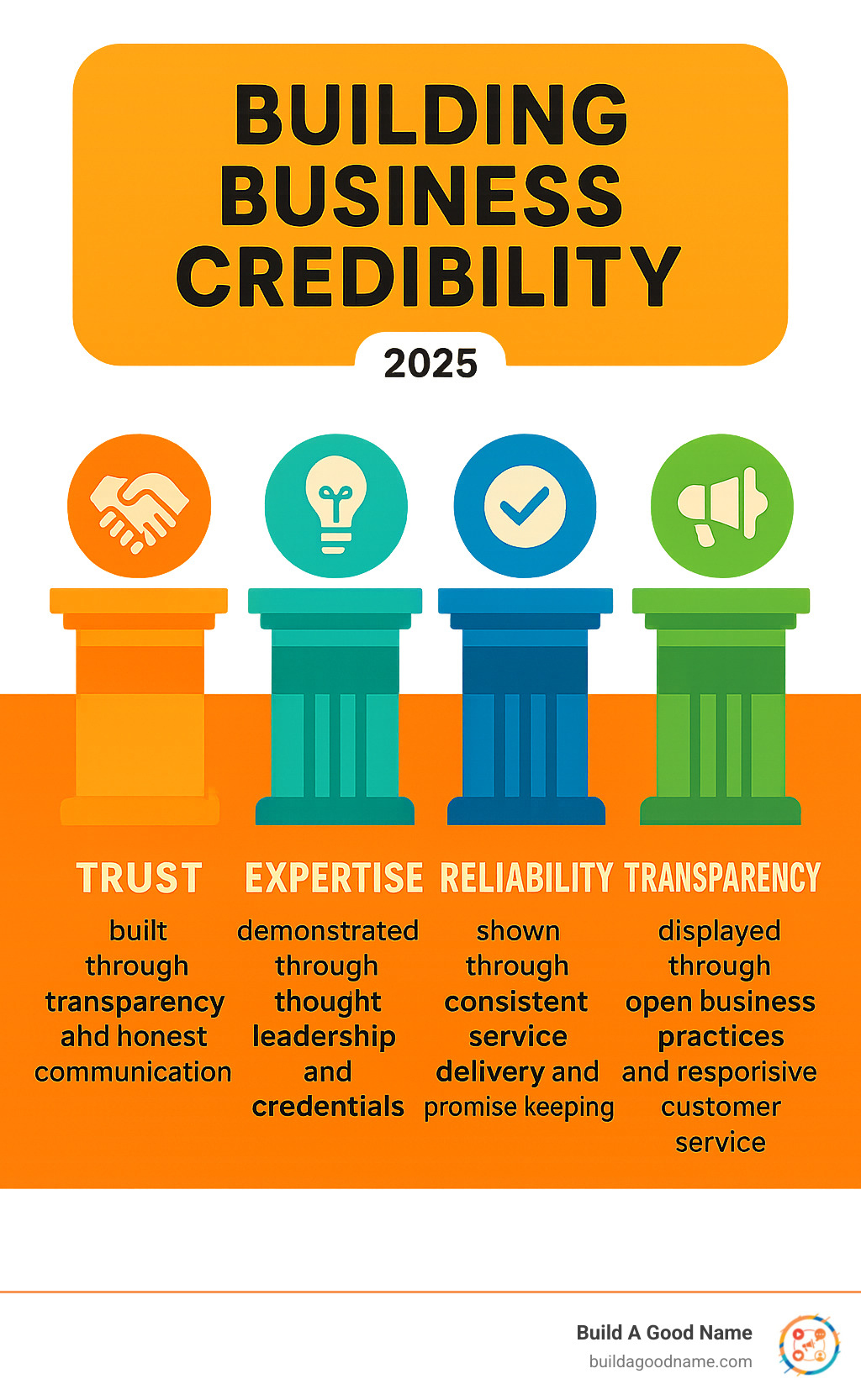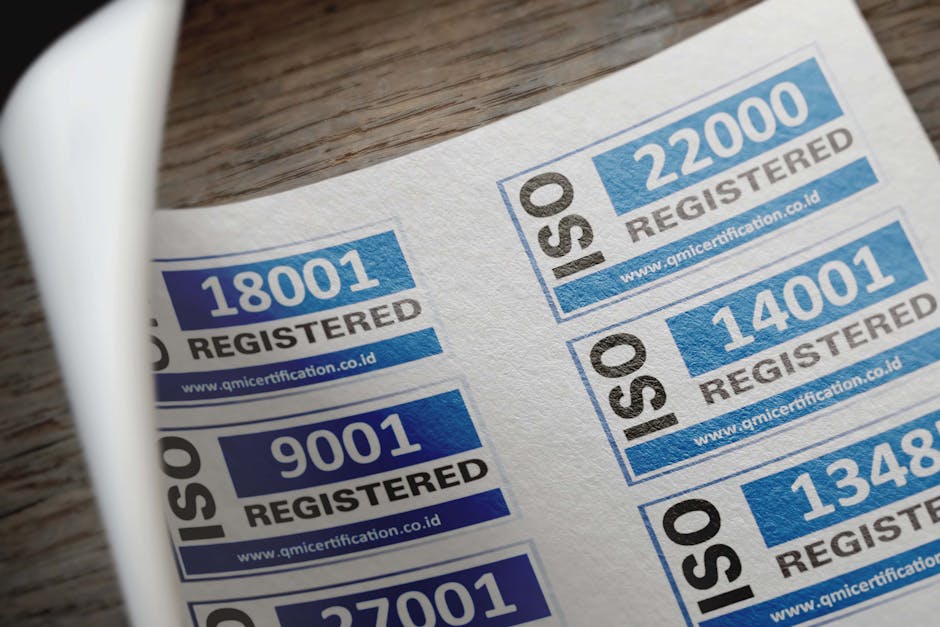Why Building Business Credibility Is Your Key to Long-Term Success
Building business credibility is the foundation that separates thriving businesses from those that fade into obscurity. It’s more than just having good products or services – it’s about earning the trust and confidence of your customers, employees, and partners through consistent, honest actions.
Quick Answer: Building business credibility requires:
- Transparency – Being honest about your business practices and owning up to mistakes
- Consistency – Delivering reliable service and maintaining consistent messaging across all touchpoints
- Expertise – Demonstrating your knowledge and competence in your field
- Responsiveness – Actively managing customer feedback and online reviews
- Professional presence – Maintaining a credible website and active social media engagement
Here’s the reality: 94% of consumers are more likely to trust brands that demonstrate transparency, and 88% say they’re more likely to purchase from transparent companies. For busy local business owners, this means every customer interaction, every online review response, and every business decision either builds or erodes your credibility.
Think of credibility as your business’s currency. As one expert puts it, credibility is “the bedrock of owner-employee and company-client relationships where all parties are confident that promises will be fulfilled.” When you have it, customers choose you over competitors, employees stay loyal, and partners want to work with you.
The challenge? Building credibility takes time and consistent effort, but it can be damaged quickly through poor customer service, ignored reviews, or broken promises. That’s why having a systematic approach to managing your reputation – especially online – is crucial for today’s local businesses.

Key terms for Building business credibility:
The Foundation of Trust: What is Business Credibility and Why It Matters
When someone says your business is “credible,” they’re really saying something powerful. They’re telling you that when you make a promise, they believe you’ll keep it. When you claim expertise, they trust you actually know what you’re talking about. When you say you care about customers, they can see it in your actions.
Building business credibility is about earning that kind of trust consistently, day after day. It’s not just about being successful – plenty of businesses hit their numbers but still struggle with reputation. True credibility means people respect how you achieve your success.
Think about the businesses you personally trust most. They probably share some common traits: they’re honest about their limitations, they deliver what they promise, and when something goes wrong, they own up to it quickly. These aren’t accidents – they’re the result of deliberate choices that build believability over time.
This foundation of trust becomes your competitive advantage. It attracts investors who want reliable partners, not just flashy returns. It creates customer loyalty that goes beyond price shopping. And it boosts employee engagement because people want to work somewhere they can feel proud of. For a deeper dive into how reputation shapes your brand’s success, check out Why Reputation Management Matters for Your Brand.
Why Credibility is Non-Negotiable
Here’s the reality: in today’s world, credibility isn’t optional anymore. When potential customers are choosing between you and your competition, trust often becomes the deciding factor – especially when your services seem similar on the surface.
Customer acquisition becomes so much easier when people believe in your business. They’re not just buying your product or service; they’re buying the confidence that you’ll deliver as promised. And once you earn that initial trust, something beautiful happens – customers don’t just make one purchase and disappear. They come back. They recommend you to friends. They become your biggest advocates.
Forbes reports that brand trust is built on how you treat customers, and this insight extends far beyond the customer relationship. Your employees are watching too. When they see you treat customers fairly and honestly, they feel proud to be part of your team. This pride translates into better employee retention, higher engagement, and ultimately better service for your customers.
Don’t forget about stakeholder confidence either. Whether you’re seeking a business loan, negotiating with suppliers, or looking for investors, your credibility opens doors. People want to do business with companies they can count on.

The ‘Credibility Bank’ Concept
Here’s a helpful way to think about credibility: imagine you have a “Credibility Bank” with your customers, employees, and community. Every positive interaction is a deposit. Every time you exceed expectations, respond quickly to concerns, or simply do what you said you’d do – that’s money in the bank.
But here’s where it gets interesting. Just like a real bank account, you can also make withdrawals. A missed deadline here, an unanswered complaint there, or worse – a broken promise – and suddenly you’re making withdrawals from your trust reserves.
The good news? Small mistakes don’t have to break the bank if you’ve built up a healthy balance. Customers are surprisingly forgiving when they trust your overall integrity and see you taking accountability seriously. The key is making sure your deposits always outweigh your withdrawals.
This intangible value you build up becomes one of your most precious business assets. It can’t be copied by competitors or bought with advertising dollars. It has to be earned, one interaction at a time. When you do face challenges (and every business does), having a full credibility bank gives you the benefit of the doubt while you make things right.
For more practical guidance on managing this crucial asset, Balancing Your Credibility Bank: A Guide for Business Owners offers excellent insights into maintaining that positive balance over time.
The Pillars of Credibility: Transparency, Consistency, and Expertise
Think of building business credibility like constructing a house. You need solid pillars to support the whole structure. Without them, everything comes crashing down. For businesses, those pillars are transparency, consistency, and expertise. These aren’t just nice-to-have qualities – they’re the foundational traits that separate trusted brands from forgotten ones.
When these three pillars work together, they create something powerful: a reputation that attracts customers, keeps employees engaged, and makes partners eager to work with you. Let’s explore how each pillar supports your credibility.

Pillar 1: Radical Transparency and Honesty
Here’s the thing about transparency: it’s scary, but it works. When customers can research everything about your business in minutes, trying to hide behind corporate speak or vague promises just doesn’t cut it anymore. Radical transparency means being refreshingly honest, even when it’s uncomfortable.
This starts with owning your mistakes. When something goes wrong (and it will), don’t hide behind excuses or blame others. Say “We messed up, here’s what happened, and here’s how we’re fixing it.” Customers respect honesty far more than perfection.
Clear pricing is another cornerstone of transparency. Nobody likes surprise fees or hidden costs. Be upfront about what things cost and why. Your customers will thank you for it, even if your prices are higher than competitors who aren’t as honest.
Open communication about your business practices builds trust too. Share how you operate, where your products come from, or what values guide your decisions. People want to know who they’re doing business with.
The numbers don’t lie: 94% of consumers are more likely to trust a transparent brand. That’s not just a nice statistic – it’s a competitive advantage. When you’re transparent, you’re not just building trust; you’re building a customer base that will stick with you through thick and thin.
Want to dive deeper into how transparency builds trust? Check out The Role of Reputation Management in Customer Trust.
Pillar 2: Unwavering Consistency
Imagine your favorite coffee shop. You go there because you know exactly what to expect – the same great coffee, friendly service, and welcoming atmosphere every single time. That’s the power of consistency. It turns one-time customers into loyal fans.
Consistent branding means your logo, colors, messaging, and tone should feel the same whether someone visits your website, sees your social media, or walks into your store. When everything matches, you look professional and trustworthy.
But consistency goes deeper than just looks. It’s about reliable service – delivering the same quality experience every time a customer interacts with you. Whether they’re calling customer service, making a purchase, or reading your emails, they should feel like they’re dealing with the same reliable company.
Predictable quality gives customers confidence. They know that when they choose you, they’re making a safe bet. There are no nasty surprises or disappointing experiences. You deliver what you promise, when you promise it.
Your messaging needs to be consistent too. What your marketing says should match what your customer service team delivers. What your website promises should align with what customers actually experience. Mixed messages destroy trust faster than almost anything else.
As business leaders often say, consistency is the key to business success. When you’re consistent, you become the reliable choice in a world full of uncertainty. Managing your online image consistently is crucial too – learn more about Reputation Management to Strengthen Your Online Image.
Pillar 3: Demonstrating Verifiable Expertise
Being trustworthy isn’t enough if people don’t think you know what you’re doing. Demonstrating verifiable expertise shows customers that you’re not just honest and reliable – you’re also really good at what you do.
Thought leadership is one of the most powerful ways to showcase expertise. When you share valuable insights, industry trends, and helpful advice, you position yourself as an authority. Here’s a compelling fact: 54% of companies made a purchase after engaging with thought leadership content. That’s the power of proving you know your stuff.
Certifications and industry credentials provide third-party validation of your expertise. Display them proudly on your website and marketing materials. They’re proof that you’ve invested in your knowledge and skills.
Case studies and success stories show expertise in action. Don’t just tell people you’re good at what you do – show them real examples of problems you’ve solved and results you’ve delivered. Nothing builds confidence like seeing proof of your capabilities.
Staying current with industry knowledge demonstrates ongoing commitment to excellence. Participate in professional groups, attend conferences, and keep up with the latest developments in your field.
Here are practical ways to showcase your expertise: blogging about industry topics, hosting webinars to share knowledge, publishing white papers that dive deep into relevant subjects, speaking at events in your community, and offering free consultations that demonstrate your capabilities.
When you consistently demonstrate your expertise, you become more than just a vendor – you become a trusted advisor that customers turn to for guidance and solutions.
Actionable Strategies for Building business credibility
Now that we understand the foundational pillars, let’s get down to the practical steps. Building business credibility isn’t a passive activity; it requires deliberate, ongoing action.

The good news? These strategies focus on tangible efforts that will make a real difference in how your business is perceived. Think of them as your daily credibility builders – small actions that compound over time to create a rock-solid reputation. For a broader look at managing your online reputation, check out our insights on Digital Reputation Management.
The Role of Customer Feedback in Building business credibility
Customer feedback has become the new word-of-mouth, and it’s incredibly powerful. When someone’s deciding whether to trust your business, they’re not just looking at your marketing materials – they’re checking what real customers are saying about you.
Here’s the reality: 68% of consumers check online reviews before engaging with a local business. That means your reputation is being shaped by customer voices, not just your own marketing efforts. This is both exciting and a little scary, but it’s absolutely manageable when you approach it strategically.
Testimonials and online reviews serve as social proof that validates everything you’ve been saying about your business. When potential customers see glowing reviews from people just like them, it removes doubt and builds confidence. The key is making it easy for happy customers to share their experiences while actively managing the feedback you receive.
Responding to reviews – both positive and negative – is absolutely critical for building business credibility. When you respond thoughtfully to every review, you’re showing that you’re attentive, that you care about your customers, and that you’re committed to resolving any issues. For negative feedback, remember: it’s not the criticism that defines your business, but how you respond to it.
Smart businesses also use feedback for improvement. Negative reviews, though sometimes painful, often contain valuable insights about where you can improve your products, services, or customer experience. When you listen and act on this feedback, you demonstrate your commitment to continuous improvement.
Our BuildAGoodName platform specializes in streamlining this entire process with automated review collection and personalized review replies. We help local businesses not only gather more positive feedback but also manage it professionally with advanced filtering that highlights your best reviews. Learn more about Customer Feedback Management and how our platform can transform your online reputation.
Maintaining a Professional Online Presence for Building business credibility
Your online presence is often the first impression potential customers have of your business. It’s your digital handshake, and you want it to be firm and confident.
A professional website is non-negotiable in today’s market. Your site should be clean, easy to steer, and error-free. An outdated or confusing website can instantly communicate a lack of professionalism and erode trust before someone even contacts you. The Stanford Web Credibility Research guidelines emphasize how crucial design and functionality are to perceived trustworthiness.
Active social media presence shows you’re modern, responsive, and connected to your community. You don’t need to be on every platform, but where you are, be genuinely engaged. Share valuable content, respond to comments, and participate in conversations that matter to your customers.
Make your contact information easy to find. Your phone number, email, and physical address should be prominently displayed on your website and social media profiles. This signals transparency and accessibility – two key ingredients in building trust.
Consistency across platforms is crucial. Your business name, address, and phone number should match exactly across all online listings, directories, and social media profiles. Inconsistencies confuse customers and can hurt your search engine visibility too.
Your online presence should offer genuine value to visitors. Share helpful tips, industry insights, or behind-the-scenes glimpses that demonstrate your expertise while giving people a reason to engage with your brand. To take charge of your digital image, explore how you can Control Your Online Reputation.
The Internal Impact: How Employee Perception Shapes External Credibility
Here’s something many business owners overlook: your employees are your most authentic brand ambassadors. How they feel about working for you directly influences how customers perceive your business.
Employee satisfaction creates a ripple effect that extends far beyond your office walls. Happy employees provide better customer service, speak more positively about your company, and naturally radiate the kind of positive energy that customers notice and appreciate.
Internal communication plays a huge role in this. When you’re transparent with your team about company goals, challenges, and decisions, they feel respected and valued. This trust translates into genuine enthusiasm that customers can sense during every interaction.
Empowering your team to make decisions and solve problems shows that you trust them. This not only improves efficiency but also ensures that customers receive better, more personalized service. Research shows that trusted leaders see six times the engagement from their employees compared to those who don’t prioritize trust.
Your company culture is like a foundation that everything else is built on. When you create a positive, supportive, and ethical work environment, it attracts better employees, reduces turnover, and ensures that your values are lived out in every customer interaction.
Think about it this way: if your employees don’t believe in your business, how can you expect customers to? But when your team genuinely believes in what you’re doing and feels good about their role in it, that authenticity becomes one of your most powerful credibility builders.
For more insights on how internal culture impacts external reputation, check out Why Reputation Management Matters for Small Businesses.
Frequently Asked Questions about Building Business Credibility
Let’s be honest – building business credibility can feel overwhelming, especially when you’re juggling everything else that comes with running a business. We hear from local business owners all the time who have real questions about how this whole credibility thing actually works. Here are the ones that come up most often:
How long does it take to build business credibility?
Here’s the truth nobody wants to hear: building credibility isn’t something you can check off your to-do list next Tuesday. It’s more like tending a garden – you plant seeds with every customer interaction, water them with consistent service, and watch them grow over time.
You can create a strong first impression pretty quickly. A professional website, some initial positive reviews, and clear communication can get you started on the right foot. But real, lasting credibility? That’s built through months and years of keeping your promises.
Think about it this way – every time you deliver exactly what you said you would, when you said you’d deliver it, you’re making a small deposit in that credibility bank we talked about earlier. Every problem you solve with a smile, every follow-up call you make, every review you respond to thoughtfully – it all adds up.
The good news? Once you start building momentum, it gets easier. Happy customers become your biggest advocates, and word spreads faster than you might expect.
Can you recover from a loss of credibility?
This is probably the question that keeps business owners up at night, and I get it. The short answer is yes, but let’s talk about what “recovery” really looks like.
Recovering from a credibility hit is like rebuilding after a storm. It takes time, effort, and a lot of patience. The first step is always the hardest – owning up to what went wrong. No excuses, no blame-shifting, just honest acknowledgment of the mistake.
Then comes the real work: showing people you’ve learned from it. This means creating a clear plan to fix the problem, communicating that plan openly, and then following through consistently over time. Sometimes, customers appreciate this kind of transparency and effort so much that your relationship actually becomes stronger than it was before.
The key is demonstrating changed behavior, not just talking about it. Actions speak louder than apologies, and consistency over time is what rebuilds trust.
Is credibility more important than marketing?
This question always makes me smile because it’s like asking whether the foundation is more important than the house. You need both, but one definitely comes first.
Credibility is the foundation that makes your marketing actually work. You can have the flashiest ads and the biggest marketing budget in town, but if potential customers check your online reviews and find a mess of unaddressed complaints, all that marketing money goes down the drain.
Think about your own buying habits. When you’re considering a new restaurant or service provider, what do you do? You probably look them up online, check their reviews, maybe ask friends for their experiences. That’s credibility at work.
Here’s the beautiful thing: once you have solid credibility, your marketing becomes incredibly more effective. People are more likely to respond to messages from brands they trust. Your satisfied customers become walking advertisements. Your positive reputation starts doing some of the marketing work for you.
So while you absolutely need marketing to get noticed, credibility is what gets you chosen. And in the long run, your reputation becomes your most powerful marketing asset.
Conclusion: Make Credibility Your Cornerstone for Success
Building business credibility isn’t just another item on your business to-do list – it’s the foundation that everything else rests on. Think about it: you can have the best product in the world, but if customers don’t trust you, they won’t buy. You can have the flashiest marketing campaign, but without credibility backing it up, it falls flat.
Throughout this guide, we’ve seen how the three pillars of transparency, consistency, and expertise work together to create something powerful. When you’re honest about your mistakes, deliver the same quality experience every time, and show that you really know your stuff, something magical happens. Customers don’t just buy from you – they believe in you.
The strategies we’ve covered aren’t complicated, but they do require commitment. Managing customer feedback thoughtfully, keeping your online presence professional, and making sure your team feels valued – these aren’t one-time fixes. They’re ongoing investments in your reputation that pay dividends for years to come.
Here’s the beautiful thing about credibility: once you have it, it makes everything else easier. Customer acquisition becomes smoother because people recommend you. Employee retention improves because your team is proud to work for a respected company. Even attracting investors or business partners gets easier when you have a solid reputation backing you up.
Remember the credibility bank concept? Every positive interaction is a deposit, building up reserves of trust that protect you during tough times. When you make credibility your cornerstone, you’re not just building a business – you’re creating a lasting legacy that customers will return to again and again.
The journey of building business credibility never really ends, and that’s actually a good thing. It means there’s always another opportunity to strengthen trust, to exceed expectations, and to show your community why they made the right choice in choosing you. To dive deeper into building lasting customer relationships, explore how to Build Customer Trust, and find why Reputation Management Drives Long-Term Success.
For businesses in Lake Elsinore looking to solidify their local reputation, managing your online reviews is the first step. Learn how we can help your Lake Elsinore business build credibility and start building the foundation for long-term success today.



